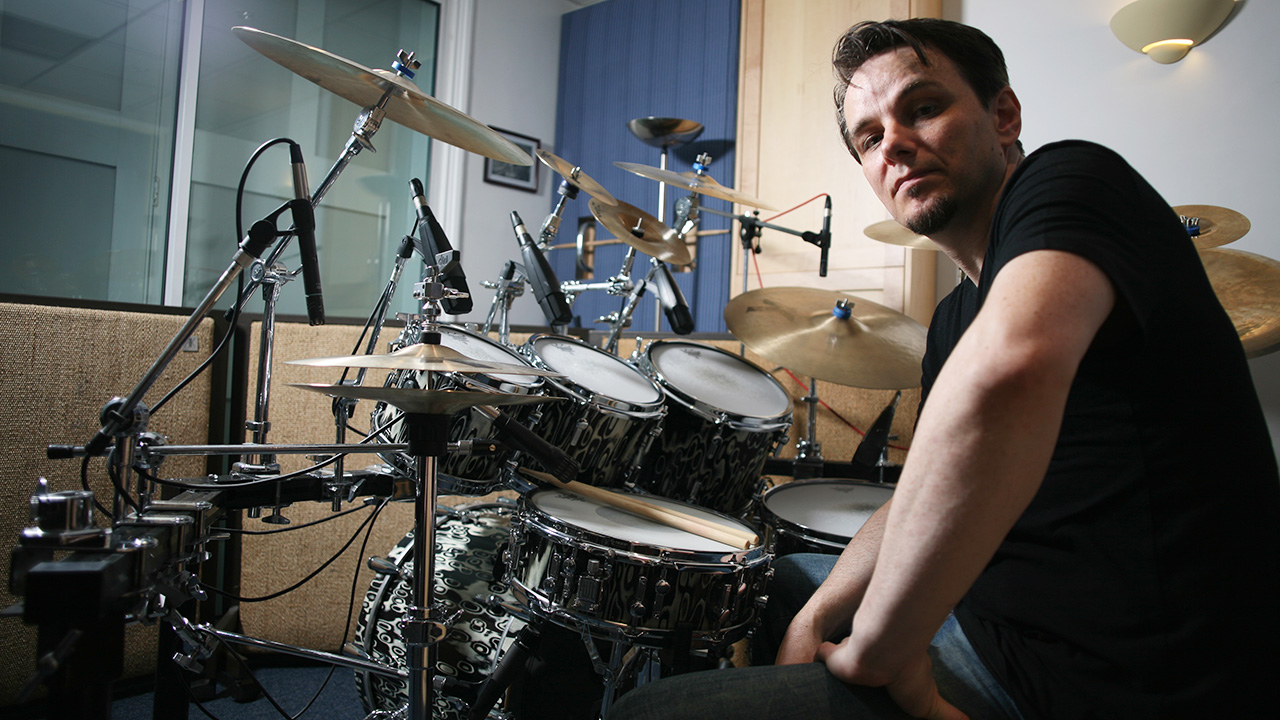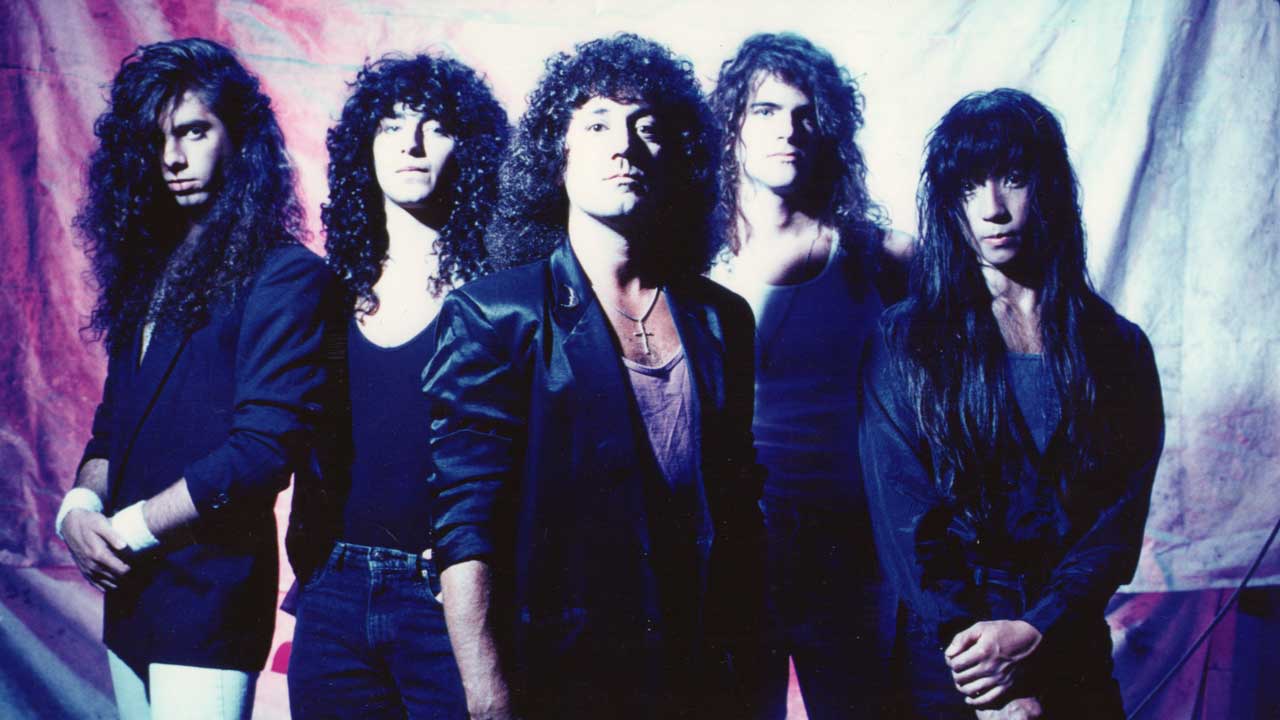“Without naming names, I have spent time onstage playing music I hate, wishing it was over”: King Crimson, Porcupine Tree and Pineapple Thief’s Gavin Harrison on being a pro
The eclectic drummer has been the jokey one in some bands and the serious, grown-up one in others - but it all comes down to the same approach

King Crimson. The Pineapple Thief. Iggy Pop. Lene Lovich. Kevin Ayers. Mick Karn. Manfred Mann. Go West. Bananarama. There can be few more eclectic CVs than that of drummer Gavin Harrison, best known as the rhythmic force behind trailblazing progsters Porcupine Tree, whom he joined in 2002. The busy man found time to talk when Circles – his second collaboration with multi-instrumentalist 05Ric – was released in 2009.
What does the collaboration with 05Ric allow you to do that Porcupine Tree doesn’t?
It gives me an outlet for some of my wildest rhythmic ideas. I generate a lot of ideas and patterns, but I’m not a songsmith; I need a songwriter to work with. When I met Ric, I told him I had a lot of ideas I was struggling to find a home for, and he said: ‘Oh, that’s exactly the way I like to work.’ It also gave me a chance to write with a view to some of the tunes being dictated by the drums. The drums could sometimes be a lead instrument.
How does working with 05Ric differ from your other projects, from working with Porcupine Tree or King Crimson, for example?
All three projects are quite wildly different. I’ve got a good, positive relationship with Ric, and it’s a very good-humoured experience: we spend most of our time joking about. But then we also did that in King Crimson, and Porcupine Tree’s the same: your distinct personalities mix up and find a place to settle. I’ve been in bands where I’m the joker, and I’ve been in bands were I’m the serious, grown-up one. Sometimes it’s more serious and intellectual, sometimes it’s dark and weird.
You’ve also played with artists like Bananarama and Lisa Stansfield; do you get much satisfaction from performing less ‘challenging’ music?
The ‘complexity thing’ isn’t something I yearn for, and I’m never there thinking, ‘Oh, this song’s so boring, I’ve got nothing to play’. I’m happy playing in any time signature. Without naming names, I have spent time onstage playing music that I hate and wishing it was over. But such is the life of a professional musician.
Sign up below to get the latest from Prog, plus exclusive special offers, direct to your inbox!
You’ve played with some fascinating people. Kevin Ayers, for instance, on his 1992 album, Still Life With Guitar.
I didn’t know anything about Kevin Ayers before I worked with him. I thought the songs were really good, but he was a little worse for wear, shall we say. At one point he headed for the control room, but accidentally walked into a tape cupboard, with no handle on the inside. So he was stuck inside. We all looked at each other, laughed, then let him out. When I listen back to those sessions, I think the stuff’s really good. It was a very entertaining couple of days.
And what about Iggy Pop, who you toured with in 1986?
He was amazing. When I first heard his stuff, it really wasn’t my cup of tea, but I needed a job and decided to give it my best shot. By the end of the tour, I was an absolute fan of Iggy. For the audition I smashed the hell out of the drums. I went absolutely crazy, then at the end, Iggy said, ‘Great, man! You’ve got the job’. And as I drove home afterwards, I thought, I don’t know if I can play like that for 90 minutes! The first time I ever saw him live, my mouth was just open, I’d never seen anyone perform with so much energy. I spent half the night laughing; it was fantastic.
You’ve also recorded with Mick Karn, whose playing is incredibly distinctive...
I first heard him when I bought [Japan’s final album] Tin Drum in the early ’80s. I thought it was the most incredible record I’d ever heard. I felt like, ‘these guys are coming from another planet. I’ve never heard anything like it.’ Mick was very prominent on it; his basslines were so melodic and powerful that they become the hook of the song. It was the same with [Japan drummer] Steve Jansen. I’d never heard anything like him either. He was a big influence on me with those Japan records.
You’ve won many awards in the ‘Best Progressive Drummer’ category, but is that too restrictive a label for your work?
I think the prog genre has become much wider than it used to be. It now includes all kinds of things that people might have thought of as experimental or alternative. It’s different to what prog used to be, let’s put it that way. I don’t know if I think of it as progressive; I just think of it as a direction I want to go in. The worst thing is making something that sounds like something you’ve done before. That’s the yardstick, really. And I think that’s true in Porcupine Tree too; we try not to repeat ourselves.
Freelance writer for Classic Rock since 2008, and sister title Prog since its inception in 2009. Regular contributor to Uncut magazine for over 20 years. Other clients include Word magazine, Record Collector, The Guardian, Sunday Times, The Telegraph and When Saturday Comes. Alongside Marc Riley, co-presenter of long-running A-Z Of David Bowie podcast. Also appears twice a week on Riley’s BBC6 radio show, rifling through old copies of the NME and Melody Maker in the Parallel Universe slot. Designed Aston Villa’s kit during a previous life as a sportswear designer. Geezer Butler told him he loved the all-black away strip.

